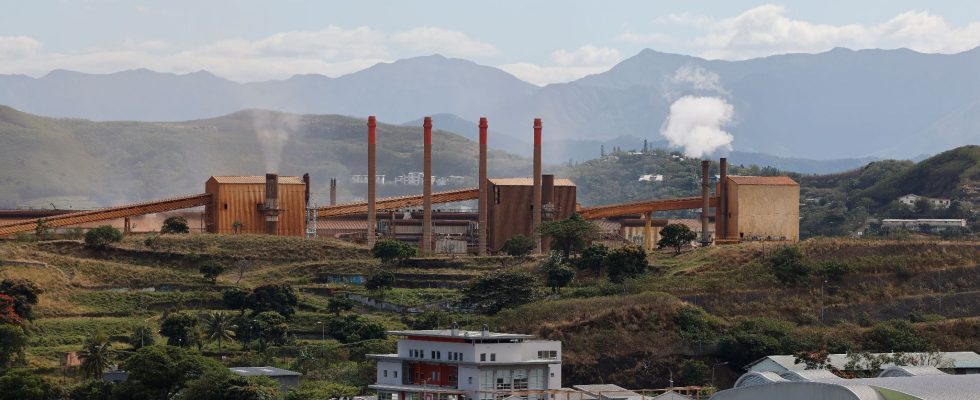The government will try to save the mines in New Caledonia. It is on this archipelago of 270,000 inhabitants located in the north-east of Australia that the Ministers of the Economy Bruno Le Maire and of the Interior Gérald Darmanin are visiting, since Saturday 25 and until Monday.
The tenant of Bercy comes in particular to one of the main economic sources of this autonomous territory: the exploitation of nickel, an almost essential ore for the manufacture of electric batteries.
Although New Caledonia is the fourth largest producing territory of this white gold, the combination of poor yields, expensive energy and strong foreign competition have plunged the three metallurgical factories processing the nickel extracted on the archipelago into the red. A situation which pushes the government to formulate avenues for reflection.
Fewer rules and greener energy
Ahead of the visit, the office of the Minister of Economy and Finance explained to AFP its three objectives to improve the situation. First, the government’s desire to liberalize the rules of the nickel market in the archipelago. According to the AFP source, the first problem comes from “permitting difficulties” for mineral supplies, and “on the other hand because the factories have technical difficulties which prevent them from reaching their full capacity”. A formulation which remains vague and does not specify the methods to remedy it.
Then, this same Bercy source criticizes the “extremely expensive energy system” of the Caledonian nickel processing factories, judging that “the other factories in the region” pay much less for their electricity. On this point, Bruno Le Maire gave an avenue for improvement: he confirmed this Saturday the promises of financial aid for the ecological transition announced by Emmanuel Macron during his visit last July, reports local media New Caledonia The 1st.
Clearly, several billion euros of aid to make New Caledonian nickel production less costly in energy and “much more carbon-free”, cites again NC The 1st. A desire to make Caledonian nickel more competitive in this sector, since the local sector is no match for the low production and labor costs of its Chinese or Indonesian competitors.
Make the sector more competitive abroad
The position of New Caledonia compared to other Asian nickel producers is also the subject of the latest point from the Ministry of Economy and Finance: the cabinet judges that the significant “nickel production capacities in the countries of the region” make competition too strong for the Caledonian sector. Bruno Le Maire is therefore banking on the development of a dual market in the future. On the set of NC The 1stthe Minister of the Economy prophesied that “the electric vehicle revolution” will create as much demand for “Asian” nickel on the one hand, [européenne] on the other”, and that the State will be able to become the spokesperson for New Caledonian nickel on the European markets.
Likewise, the government intends to rely on a part of the nickel sector which is profitable: mining extraction. For the minister’s office, since “mining activity is profitable” unlike factories that process nickel, a solution would be to lift the ban on exports of raw ore to factories outside New Caledonia, included in the mining code since 2015. An avenue also mentioned by Emmanuel Macron last July. It is an issue that is just as economic as it is political, since this zero export rule was decreed by the separatists in order to transform Caledonian gray gold locally and create economic activity at the local level, reminds us of everyday life Le Figaro.
A sector in debt despite its potential
Despite these avenues, the challenge is significant, given that the three metallurgical factories on the island are in the red. The historic industrialist, Société-Le Nickel (SLN), is heavily indebted to the tune of 493 million euros in financial debt. And its majority shareholder confirmed at the end of October that it would not inject more money into its subsidiary. Prony Resources, in the south of the territory, is placed under ad hoc mandate with a debt which reached 149 million euros at the end of 2022. As for the ferronickel production plant Koniambo Nickel SAS, it also has a record debt of 13, 7 billion euros.
A situation that is all the more damaging as nickel has become one of the most sought-after metals worldwide, particularly for manufacturing electric car batteries. According to a report from the General Inspectorate of Finance (IGF) published at the beginning of Augustthe Caledonian sector could “theoretically represent” up to 85% of the needs of French battery gigafactories in 2030, or “14% of the EU’s needs in 2035”.
But the General Inspectorate of Finance has seriously considered the imminent closure of these factories, in the absence of “further intervention by private actors and public authorities”. According to its report, the “simultaneous failure” of the three companies “would lead to an increase in unemployment in the territory of around 50%”, in addition to significant environmental costs.
